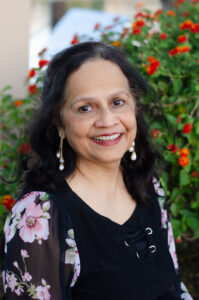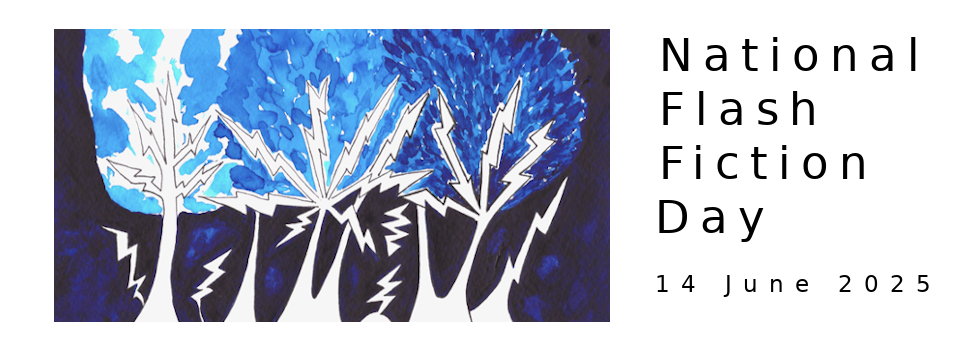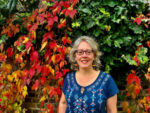Welcome to the third of our series of interviews with this year's National Flash Fiction Day Anthology Editors and Microfiction Competition Judges! Submissions for the Anthology and Microfiction Competition are open until 15 February 2025.
This week, NFFD's Diane Simmons chats with Sudha Balagopal, one of this year's NFFD Microfiction Competition Judges, about her writing habits, novellas in flash, advice for those new to writing microfiction, and more....
 DS: You were runner up in this year’s Bath Novella-in-Flash Award with your novella Nose Ornaments and highly commended in their 2021 competition with your novella Things I Can’t Tell Amma. Both novellas went on to be published by Ad Hoc Fiction. Could you tell us a little about them?
DS: You were runner up in this year’s Bath Novella-in-Flash Award with your novella Nose Ornaments and highly commended in their 2021 competition with your novella Things I Can’t Tell Amma. Both novellas went on to be published by Ad Hoc Fiction. Could you tell us a little about them?
SB: Nose Ornaments narrates the story of three generations of women from the same family—grandmother, mother and daughter. The tale starts in 1960s India and ends in contemporary times in the US. All three are strong women who confront and surmount the challenges in their lives. The novella explores the complexity of the women's relationships with each other and illustrates the struggles in their quest for meaning and love.
Things I Can't Tell Amma, is set in the 1980s and tells the story of Deepa, a student who travels from India to the US to pursue further studies. Everything in the US is different, the grocery stores, how students dress, how professors teach. Besides, she must also contend with loneliness, little money and a sense of displacement. Along the way, she adopts a baby quail, finds a friend, and falls in love with her neighbor.
DS: You were highly commended in the 2024 and 2023 National Flash Fiction Day Micro Competition. Do you have any advice for someone perhaps attempting a micro of 100 words for the first time?
SB: Every writer has come across this six-word story at some point: “For sale: baby shoes, never worn.” Readers get the depth, the intensity and the the emotion from what’s left out. The iceberg theory, attributed to Hemingway, says that if a story is like an iceberg, then, only the tip is visible. A short-short format, such as the 100-word story, challenges the writer shave that tip down until the story is becomes like a word snapshot, a dense nugget that captures a small, but intense moment with layers of the unsaid. So write long first, find the emotional crux, then shear the unnecessaries until you have your gem.
DS: The first National Flash Fiction Day in the UK was in 2012. Can you remember when you first heard about NFFD? Is there a story from any of the anthologies that stays in your mind?
SB: I learned about NFFD through Twitter, which I joined in 2016. I don't believe I actually engaged with the posts until a couple of years after that. I think FlashFlood attracted me first and later the micro fiction contest. One of the NFFD stories I love is Adverb, by Sara Siddiqui Chansarkar. It is dense and emotion-packed and a worthy winner of an Honorable Mention in 2021.
DS: Do you need silence or an empty house to write or would you rather be in a crowded café or a room full of people?
SB: I spin stories in my kitchen, surrounded by food, by cooking fragrances, the rattling dishwasher. I have always written at home; the appeal of comfortable clothing and ready access to food/beverages far outweighs the lure of a crowded cafe!
DS: Do you enjoy performing your stories at writing events? Does knowing you might have to read it out loud ever affect how you write a story or do you ever alter the wording slightly before performing it?
SB: I do enjoy reading my stories at events. I've come to realize that the story's impact is vastly different when it's read aloud in the author's voice. And no, when I write I do not consider that I might, at some point, have to read it to an audience. As far as altering the wording before a reading, there are occasions when I might edit the story slightly, mostly to adhere to time/word constraints.
Sudha Balagopal is an Indian American writer whose fiction straddles continents and cultures, blending thoughts and ideas from the east and the west. Most recently, her novella in flash, Nose Ornaments, was published by Ad Hoc Fiction, UK. Her highly commended novella in flash, Things I Can’ t Tell Amma, was published by Ad Hoc Fiction in 2021. Nominated for several awards, her work has appeared in Best Microfiction, 2021, 2022 and Best Small Fictions, 2022, 2023, 2024. When she’s not writing, she teaches yoga.





